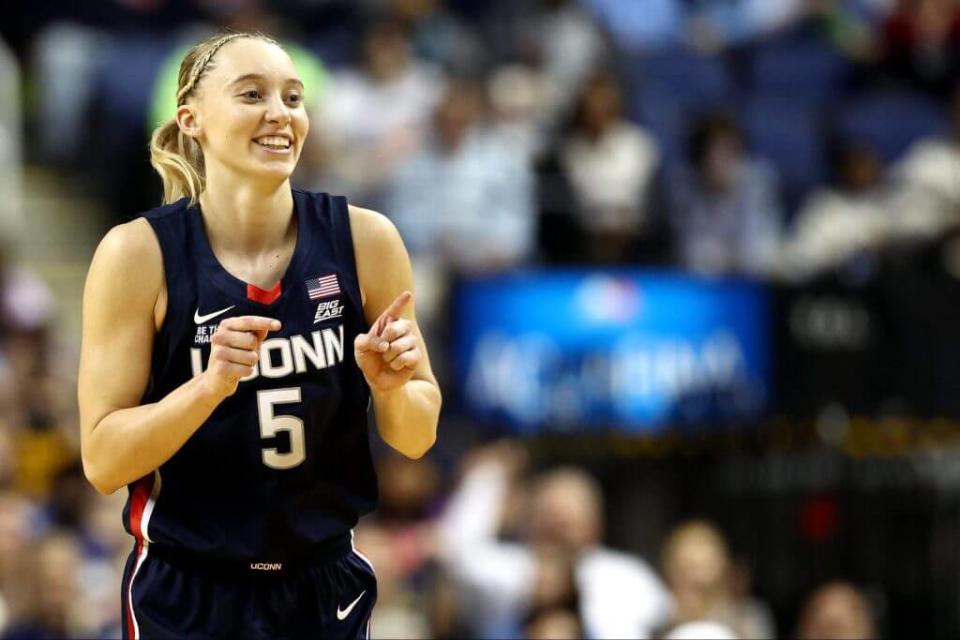
The WNBA Draft lottery is in the books, setting the order for April’s 2025 draft. Similar to the past two years, there shouldn’t be much drama at the top, considering the only way Paige Bueckers doesn’t get drafted first is if she elects to stay at UConn for an additional season. For the most part, this mock draft doesn’t include players who have another year of eligibility, but I’ve included a couple of exceptions, namely Bueckers, who said she is treating 2024-25 as her final season.
This is the league’s first draft with 13 teams, as the Golden State Valkyries will begin play in the 2025 season. However, there are still only 12 picks in the first round because the Las Vegas Aces lost their pick for providing impermissible player benefits.
Let’s look at which players are the best fit for each WNBA team.
This is a dream scenario for the Wings, who have tons of depth in the frontcourt with Satou Sabally, Teaira McCowan and Maddy Siegrist, but Dallas needs an organizing force in the backcourt. Bueckers has vacillated on the positional spectrum throughout her UConn career, but her playmaking has thrived regardless of where she is placed on the court. She has ranked in at least the 92nd percentile in assist percentage every season while also placing in the 98th percentile or above in assist-to-turnover ratio. Even if Bueckers isn’t a prototypical point guard (and won’t be asked to play that role with KK Arnold and Kaitlyn Chen on the Huskies’ roster this season), her selflessness means she’s constantly looking to create for others.
Bueckers is also an exceptionally efficient scorer who finishes at an elite rate at all three levels (in the paint, midrange and beyond the arc). On defense, Bueckers has shown the ability to guard one through four. She is strong in isolation but a menace as a help defender, reading the floor as well as she does on offense to pick off passes and jump-start the Huskies’ transition attack. The No. 1 recruit in her high school class has been as good as advertised, showcasing a complete set of skills in college that also figures to translate seamlessly to the pros.
I just fell to my knees. THANK YOU LORD! 😭😭😭😭
— Arike Ogunbowale (@Arike_O) November 17, 2024
It’s risky to draft for need at the No. 2 pick, and Kiki Iriafen is the higher-rated prospect, but the Sparks need a guard in a bad way, especially since they already sent away their 2026 first-round pick to the Seattle Storm. There is nothing to be gained from another year of missing the playoffs. With Cameron Brink and Rickea Jackson already on the roster — as well as a still-in-her-prime Dearica Hamby — Los Angeles needs someone to lead its offense, and that’s Miles.
Although she missed her junior season with a torn ACL (and can technically return to Notre Dame for one more year), Miles has looked spry through the Irish’s first four games, gliding up and down the court and showing off her trademark passing vision. Miles is always looking to generate offense in transition, and she creates windows in the half court with her accurate ball delivery. She keeps defenses honest with her drives to the hoop and seems to have used the year off to refine her shooting stroke, as she’s making 47 percent of her 3s and 83 percent of her free throws. The Irish have generally relied on perimeter talent during Miles’ tenure, but she should have minimal difficulty transitioning into a post-heavy offense with her IQ.
Miles is also a strong defender with good size for her position. It’s easy to imagine her covering ones in isolation but also switching on the perimeter alongside Rae Burrell and Jackson.
This isn’t an ideal fit for the Sky, who already have Kamilla Cardoso and Angel Reese. However, the franchise is only one year out of the playoffs and can afford to be patient in the rebuild, even if that means overloading in the frontcourt to get another talented player.
Iriafen came on a little late in her college career because of the glut of bigs ahead of her at Stanford, but she excelled when given a regular role. She’s a high-usage, high-efficiency scorer, and she improves when the lights are brighter. Iriafen’s athleticism pops on the floor, whether it’s her first step when facing up, her elevation at the rim or her competitiveness on the glass. Ideally, she’d harness that athleticism more on defense, where she hasn’t been an elite playmaker — the Cardinal’s defense wasn’t noticeably different with her on or off the court. However, her physical tools suggest she can be impactful on this end, and USC will be reliant on that.
Stanford’s history of producing high-level frontcourt players also works in Iriafen’s favor. Before the 2024 draft, WNBA general managers compared her game to Nneka Ogwumike’s. The 2012 No. 1 pick’s college career was far more decorated than that of Iriafen, but they have similar builds and play styles, providing an ideal ceiling for Iriafen in the W.
The Mystics are yet to hire a GM or coach, so the decision-making falls to Michael Winger, the president of Monumental Basketball for the Mystics and the NBA’s Wizards. What we know about Winger from his NBA experience is that he believes in building patiently through the draft. From his two drafts with the men’s team, it’s clear he loves young French prospects, as the Wizards drafted 18-year-old Bilal Coulibaly in 2023 and 19-year-old Alex Sarr in 2024. That makes this the perfect franchise to swing big on Malonga, who will turn 20 before the draft.
Malonga is a special athlete, vertically and laterally, as the first Frenchwoman to dunk in a game. She averaged 11.9 points and 8.9 rebounds in the French league in 2023-24 despite being several years younger than most of her competition, and she improved those numbers to 19.3 points and 13.3 rebounds during the playoffs. She also came off the bench for France during the Olympics as the home team won a silver medal. Her ability to create with the ball in her hands is also unique for a frontcourt prospect.
The Mystics already have Shakira Austin as a young center, but injuries have limited her to 31 games through the past two seasons. Malonga’s age and the uncertainty over Austin’s health make taking a shot on the young French star worth it.
It is challenging to pick a player for a team with an empty roster, so expect this spot to change significantly until the draft. For now, let’s start with a point guard who knows how to run a pro-style offense: Amoore. Amoore has been confidently operating out of the pick-and-roll for three years, leading one of the country’s best offenses at Virginia Tech. She’s a superb ballhandler and decision-maker, even if her flair sometimes gets her into trouble.
Like another point guard who plays for a Golden State team, Amoore also loves to shoot from long distance, creating massive space despite her small frame thanks to her side-step takeoff. Her percentage has cratered on self-created 3s, though those shots are often forced upon her when the offense can’t generate a better look; however, she shot 43 percent on spot-up 3s over the past two seasons and has great shooting form provided she can limit her volume.
Amoore has been learning from fellow small guard Kelsey Plum for the past two seasons and would benefit from playing for Natalie Nakase, Plum’s former assistant who happens to be another short guard. Amoore is personable and marketable, and she makes a ton of sense as a building block for a new franchise.
Ideally, Citron would land on a team better positioned to compete immediately — and perhaps someone will trade up for her — but she’s simply too talented and productive to fall below this spot. Citron is a career 37 percent 3-point shooter and 83.4 percent free-throw shooter who can also drive and finish through contact. She rebounds well for a perimeter player and is also a terrific defender from one to three. She’s overtaxed creating with the ball in her hand but is an outstanding secondary option. In a league thin on wings, Citron will have a role to play for years.
The Indiana Fever would be a perfect landing spot for Citron if they are willing to fork over some assets to Washington. As it stands, the Mystics would be fortunate to have her as part of their rebuild.
The Liberty thrived with a wing-heavy, physical identity last season, particularly during the postseason and especially when they went with three bigs in the decisive Game 5 of the WNBA Finals. Even if Maddy Westbeld seems positionally redundant, New York will find a way to get her on the court given her toughness, ability to defend multiple positions and 3-point shooting. It’s easy to imagine Westbeld eventually taking over for Kayla Thornton as an interior defender — nobody gave Elizabeth Kitley more difficulty than Westbeld during the All-American’s 2023-24 season. Although Westbeld doesn’t have noteworthy athleticism, her production has never suffered for it.
Westbeld is also an intuitive offensive player who moves off the ball well, a necessity in New York’s system. If worse comes to worst and Westbeld’s injury issues to start the season linger, New York has proved it’s among the best places to rehab in the WNBA.
The Fever need to improve their defense and perhaps find a combo forward who can improve on what NaLyssa Smith brought last season. However, that type of player isn’t available at this point in the draft, so why not double down on what Indiana does well? The Fever already have offensive firepower with the backcourt of Caitlin Clark and Kelsey Mitchell, and bringing in Paopao as a sub for either keeps the level high. Paopao is one of college basketball’s most outstanding shooters in recent memory; she made 46.8 percent of her attempts last season, leading the nation. She also runs a mean pick-and-roll, reads the floor well, has a developing floater and generally executes everything you would want from a lead guard or two-guard offensively.
Defensively, being at South Carolina has worked wonders for Paopao. She has improved at staying in front at the point of attack, and she positions herself well in help defense. Paopao isn’t the type of player who will single-handedly raise Indiana’s defensive floor, but she can earn minutes by avoiding mistakes.
But this pick isn’t about the defense. Just imagine trying to defend a Clark/Aliyah Boston pick-and-roll with Mitchell and Paopao surrounding them. It seems physically impossible.
The Storm need some young talent with upside. They have Jordan Horston but no one else who is realistically on the front end of their development curve now that Nika Mühl is out for the season with a torn ACL. This feels like an opportune moment to bring in Sellers, a player with great athleticism and a high IQ. Sellers is a dynamic downhill attacker who has a good-looking jump shot. She has incredible pace in the open court and is the foundation for Maryland’s transition attack. Her point guard reps in college have been useful, but at 6-2, she can play multiple positions, giving her additional utility in the pros. The sky is the limit with Sellers.
The early returns from Rivers’ senior season have indicated she is best with the ball in her hands as the lead guard, which makes Chicago a useful landing spot, since Lindsay Allen is a capable caretaker point guard, but not the option for the future. Joining Tyler Marsh is also a boon for Rivers. She is hyper-athletic and gets into the paint with ease, and being disruptive doesn’t begin to describe the defensive havoc she can wreak. But her jumper and decision-making need some work. Rivers’ physical tools bring to mind a younger Jackie Young. Marsh helped turn the Aces star into an efficient offensive player, and that will be the task with Rivers.
The Lynx got quality play out of their lead guard spot from Courtney Williams, but they could still use a true point guard to set up their scorers. Leger-Walker is a wonderful passer in the half court — her skip passes out of the pick-and-roll demand multiple rewatches. She’s been inconsistent as a shooter, but perhaps sitting out for a year with a torn ACL will force her to develop her jumper. Leger-Walker hasn’t brought much to the floor as a defender, but Minnesota drafted Alissa Pili last year, so that doesn’t seem to be a prerequisite.
Phoenix played most of last season without a true power forward, which creates an opening for Morrow. She puts pressure on the basket, rebounds the ball better than almost anyone at her position, consistently makes plays on defense and gets buckets no matter who else is on the court. Those attributes would benefit the Mercury. The one issue for Morrow in Nate Tibbetts’ system is that she doesn’t take or make 3s, but she does so many other things well that it would be hard to pass on her at the end of the first round.
Also in consideration: South Carolina’s Raven Johnson, Kansas State’s Ayoka Lee and Ole Miss’ Madison Scott.
This article originally appeared in The Athletic.
Minnesota Lynx, New York Liberty, Seattle Storm, Los Angeles Sparks, Washington Mystics, Atlanta Dream, Chicago Sky, Connecticut Sun, Indiana Fever, Dallas Wings, Las Vegas Aces, Phoenix Mercury, USC Trojans, Notre Dame Fighting Irish, North Carolina State Wolfpack, Maryland Terrapins, UCLA Bruins, South Carolina Gamecocks, Kentucky Wildcats, Connecticut Huskies, LSU Lady Tigers, Golden State Valkyries, WNBA, Women’s College Basketball
2024 The Athletic Media Company
EMEA Tribune is not involved in this news article, it is taken from our partners and or from the News Agencies. Copyright and Credit go to the News Agencies, email news@emeatribune.com Follow our WhatsApp verified Channel





